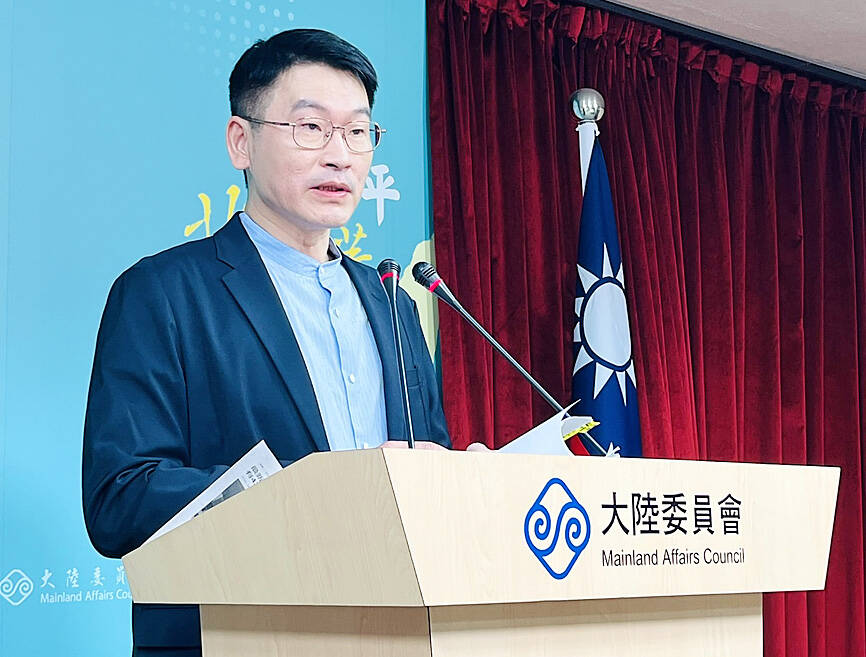-
By Chen Yu-fu and William Hetherington / Staff reporter, with staff writer
and Bloomberg
Mainland Affairs Council Deputy Minister Liang Wen-chieh (梁文傑) yesterday reiterated the council’s call to Taiwanese to be mindful when traveling in China due to increased safety concerns.
In a radio interview, talk show host Huang Wei-han (黃暐瀚) asked Liang to comment on the council raising its travel alert for China to “orange” — the second-highest alert — and its effect on Taiwanese who operate businesses in China or need to visit China.
The government uses a four-tier travel advisory regarding safety and security risks in other countries and territories.
Photo: Chen Yu-fu, Taipei Times
The council on Thursday last week raised the travel alert for China, Hong Kong and Macau to “orange,” advising Taiwanese to avoid unnecessary travel to these areas.
Liang yesterday said that for Taiwanese businesspeople based in China, raising the alert was meant to remind them about China’s amended Counter-Espionage Law and Law on the Guarding of State Secrets.
The amendments to the espionage law took effect yesterday, and enable Chinese national security authorities to inspect travelers’ smartphones and other electronic devices.

Photo: CNA
A Taiwanese businessman for unknown reasons was recently accused of contravening China’s National Security Law, Liang said.
In related news, Taiwanese senior security officials on Friday told a briefing in Taipei that Beijing is likely to detain more Taiwanese under a law that targets supporters of Taiwanese independence in a bid to pressure President William Lai (賴清德).
They were referring to a set of new legal guidelines issued by Beijing on June 21 that allow courts in China to try “Taiwan independence separatists” in absentia, with “die-hard” advocates of independence convicted of inciting secession and causing “grave harm to the state and the [Chinese] people” potentially facing the death penalty.
The move by Beijing to flesh out the law amounted to weaponizing its legislation against Taiwan, said the officials, who asked not to be identified.
The officials were speaking based on assessments made by Taiwan’s national security apparatus, rather than any intelligence they had gathered.
China has detained 15 Taiwanese over the past few years, the officials said.
Beijing sees Lai as an independence advocate, and has vowed unify with Taiwan, by force if necessary.
After Lai won the presidential election in January, Nauru switched diplomatic recognition from Taipei to Beijing, and just days after he took office on May 20, China held its most expansive military drills in a year around Taiwan.
It also hit five Taiwanese political commentators with largely symbolic sanctions, saying they had “incited hostility and confrontation between the two sides of the Taiwan Strait.”
From January to May there were 74 personal safety-related complaints and 13 property rights-related complaints filed with the Straits Exchange Foundation by Taiwanese businesspeople operating in China, foundation data showed.
China’s relatively weak economic recovery, combined with low consumer spending, has prompted local governments in the country to scrutinize the taxes of businesses operating there, a source said on Sunday.
The situation has prompted many Taiwanese businesses to withdraw from the Chinese market, but those exiting the market are finding it hard to get their funds out of China, the source said.
“China has control over the remittance of funds, so some Taiwanese businesspeople choose to use back channels,” the source said.
“In some cases, the money is embezzled and is difficult to recover even when the victim reports the matter,” they said.
The standard is for back channel services to take a 30 to 40 percent cut of the funds they are handling, and anyone using such services can risk losing all of their money, the source said.
“Taiwanese businesspeople in China who use these services tend to do so because they urgently need their money accessible to them in Taiwan,” the source said. “But the risk is very high, and anyone not in a hurry would refuse to pay such a high commission.”
In some cases, businesspeople encountering trouble in China can get assistance from the foundation, which would communicate with its Chinese counterpart, the Association for Relations Across the Taiwan Straits (ARATS), the source said. However, contacting ARATS is not an option when back channels have been used to transfer money out of China, they said.
“Even if ARATS could be contacted in such cases, it would not be in the Taiwanese person’s interest to do so, as that would incriminate them,” the source said. “From a legal perspective, it is also difficult to prove how much money was originally transferred and how much money was embezzled. There is no receipt for this kind of thing.”
There have also been cases in which Taiwanese businesspeople have defrauded other Taiwanese businesspeople in China, they said.
For example, the person committing fraud might accept a sum of money and promise to transfer it to a third country before transferring it to Taiwan through private channels, but never transfer the money to Taiwan, the source said.
“We have seen some people who, in a bid to avoid risk, will just move money out of China using Chinese UnionPay cards, slowly withdrawing it in Taiwan through several ATM transactions per year,” the source said. “In other cases people have transferred money to Southeast Asia in the name of reinvestment, and then transferred it from there to Taiwan.”
Comments will be moderated. Keep comments relevant to the article. Remarks containing abusive and obscene language, personal attacks of any kind or promotion will be removed and the user banned. Final decision will be at the discretion of the Taipei Times.

